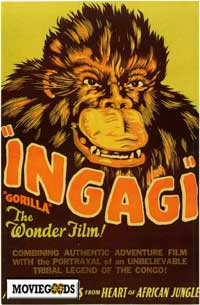Historical Miniature
The LA Times this weekend has a great article about the predecessor of King Kong: Ingagi.
As only a handful of zoos and circuses exhibited apes during the early 20th century, movies featuring all forms of monkeys emerged as a popular genre, and some filmmakers, such as William S. Campbell, seemed to specialize in monkey-themed films, with "Monkey Stuff" and "Jazz Monkey," in 1919, and "Prohibition Monkey" in 1920. Schoedsack warmed up for "King Kong" by directing "Chang" in 1927 (with Cooper) and "Rango" in 1931, both of which prominently featured monkeys in real jungle settings. The debate about evolution at the Scopes monkey trial of 1925 further spurred interest in primate pictures.
Capitalizing on the craze, Congo Pictures Ltd. released "Ingagi." All advertisements for the film explained that "ingagi" means "gorilla." And every ad and article stated that the movie documented an authentic, scientific two-year expedition in the Belgian Congo, produced by Sir Hubert Winstead of the Royal Geological Society, who appeared in the film along with American sportsman Capt. Daniel Swayne.
Congo Pictures, formed expressly to make the film, could afford only one print, and it arranged for a two-week run at a theater in San Diego, where it played to more than 40,000 people. But efforts to interest New York-based film distributors failed, and Congo had to book "Ingagi" theater by theater.
Congo rented Chicago's Garrick Theatre, advertising the film as "an authentic incontestable celluloid document showing the sacrifice of a living woman to mammoth gorillas!" The Motion Picture News credited "lurid lobby advertising depicting a gorilla fondling a near-nude native woman" for drawing crowds to the Garrick.
"Ingagi" was an unabashed exploitation film, almost immediately running afoul of the Hollywood code of ethics created by the Motion Picture Producers and Distributors Assn. (MPPDA), a consortium of the major motion picture studios popularly known as the Hays Office. A week after "Ingagi's" Chicago debut, the Hays Code was modified to state that: "Sex perversion or any inference of it is forbidden" and "Complete nudity is never permitted."

